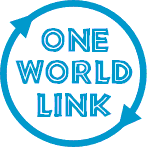Thinking Linking Through
Download ‘Thinking Things Through’, a resource designed to support educators to develop the awareness and skills to address some of the barriers to responsible N-S school linking practices.
Linking can provide opportunities to enhance all curriculum areas.
It can provide the opportunity for a fulfilling and wider world experience for both students and staff.
Linking can motivate students encouraging them to take responsibility for their own learning, inform debate and heighten awareness of global issues.
If accessible, IT can play a vital part in joint work between schools.
Linking can enable students and teachers to be partners in learning, developing their skills in communication and enquiry and providing a context for them to reflect on their attitudes, gain an understanding of other perspectives and challenge stereotypical views.
It can also lead students towards considering their own place as part of the global community and gain a participative view of the international organisations that can assist in empowering them to make change.
Partnership agreements.
The British Council says:
A formal arrangement can ensure that both parties share and agree goals and aspirations for their school link.
Read more …
There may be the opportunity for staff and student visits and exchanges as part of the link.
Successful linking is a challenge in schools.
Schools are dynamic institutions with young people changing classes and teachers as they move up through the school and teachers often changing roles and leaving.
Each year, activities and lessons are repeated for the students reaching that stage in school and student’s interests and levels of engagement also change as part of the natural cycle.
Staff roles and responsibilities also often change within the school and of course they may leave.
Schools are therefore inextricably linked with change and continuity can therefore be difficult to achieve.
- Opportunities
- make the curriculum real and relevant
- provide real learning about real issues
- enhance education and curriculum
- provide experiential training/learning
- learn about own culture through learning about another
- encourage global awareness
- break down stereotypes
- make friendships
- develop creativity within the curriculum
- enhance personal and professional development
- develop critical thinking skills
- a partnership agreement (MOU)
- embedded in the curriculum
Linking can help your school and your students to:
- Challenges:
- clarity of aims: having a joint vision
- different socio-political contexts
- need for reflection
- promotion of stereotypical views
- strategies to manage resource inequalities
- differences in methodology
- demands on staff
- curriculum demands of each school
- staff changes and continuity
- need for genuine and regular communication
- effects of year groups moving up
- differences in numbers of students
- fitting the link into the school day
- timetable priorities and differences
To maintain a truly mutually beneficial and equal partnership the link requires acknowledgement and awareness of:
Checklist:
the following are important in order to sustain the link:
- senior management involvement*
- more than one teacher involved
- link management committee*
- included in school development plan*
- a partnership agreement
- embedded in the curriculum
- plans for sustainability and continuity*
- strategies for teacher training on the global dimension*
- funding to administer the link
- resources: time, energy, money*
- governor and parental involvement?
- wider community involvement: consider teacher to teacher groups from both areas
- an awareness of external resources
* Essential elements:If you find that you can’t tick all the items on the left marked with an * then you should think again about linking or how you are linking!
- Resource-rich communities need to:
- Ensure an equal and sharing relationship
- Engage with global issues and interdependence
- Ensure opportunities for reflection
- Recognise and appreciate different value systems and perspectives
- Acknowledge the legacy of colonial relationships
- Recognise the difference in teaching techniques
- Recognise and appreciate what the link school has to offer
- Take care not to lead the agenda
- Avoid representations of partners as poor
- Avoid engagement by students on fundraising for ‘poor’ partners
- Be aware of the challenges of fundraising to maintaining an equal partnership
- Explore perceptions of what the relationship means to each partner
- Resource-poor communities need to:
- ensure an equal and sharing relationship
- ensure their voice is heard and valued
- ensure recognition of different value systems and perspectives
- recognise the difference in teaching techniques
- ensure full and equal participation in the partnership
- create opportunities to reciprocate within the link
- recognise what they can offer the partnership
- ensure contributions to the link are recognised, acknowledged and valued
- explore perceptions of what the relationship means to each partner
- manage expectations of the link school

